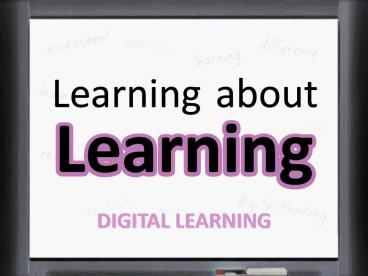DIGITAL LEARNING - PowerPoint PPT Presentation
1 / 25
Title:
DIGITAL LEARNING
Description:
To increase understanding of digital literacy and its impact upon learning ... Digital forums and chat rooms are changing the way that young people communicate ... – PowerPoint PPT presentation
Number of Views:8005
Avg rating:3.0/5.0
Title: DIGITAL LEARNING
1
DIGITAL LEARNING
2
Aims
- To increase awareness of how technology is
changing the nature of teaching and learning in
schools
3
Aims
- To increase awareness of how technology is
changing the nature of teaching and learning in
schools - To increase understanding of digital literacy and
its impact upon learning
4
Aims
- To increase awareness of how technology is
changing the nature of teaching and learning in
schools - To increase understanding of digital literacy and
its impact upon learning - To consider ways in which ICT can help to create
enriched learning environments
5
Introductory Group Discussion
In what ways has the growth of ICT changed the
nature of learning and teaching in this school?
6
Introductory Group Discussion
When it comes to ICT, young people are already
streets ahead of most teachers.
7
Information Movie
Technology and Learning
8
Key Points
- In recent years there has been a huge growth in
the emergence of new digital technologies - These emerging technologies present opportunites
as well as challenges to schools - Learners have access to an ever-widening range of
computer-based applications
9
Key Points
- The internet has reshaped our lives in the
workplace, home and at school - Reading and writing now embraces sound, graphic
images, video, animations, semiotic languages and
hypertext - Email and mobile phone use is redefining social
interaction
10
Key Points
- Digital forums and chat rooms are changing the
way that young people communicate - Blogs, wikis and podcasting are changing the
nature of publication - Low cost digital cameras, animation, movie and
music software are enriching learning
environments and fostering creativity
11
Key Points
- Schools are making increased use of digital
technologies in teaching and learning - Digital learning is changing how brains are wired
- new thinking patterns are emerging - Schools staff must learn to use these new digital
technologies and embed them into learning and
teaching
12
Perspective Movies
A Revolution of Voice Stephen Heppell Age of
Learning David Weinberger
13
Key Question
To what extent does our school or department
foster digital literacy in our learners?
14
Key Question
How is our school/department equipping young
people for life and work in an age of rapidly
changing technology?
15
Key Question
Which new technologies have we integrated into
our day-to-day classroom work and how do we use
them?
16
Key Question
To what extent do we embed ICT when planning and
designing the curriculum?
17
Key Question
To what extent are emerging digital technologies
changing established learning routines?
18
Key Question
What are the key challenges and opportunities
that this changing digital landscape presents for
our school?
19
Key Question
How can school staff keep up to date with this
rapidly changing landscape?
20
Key Question
In what ways can ICT help to develop the
creativity of both learners and school staff?
21
Key Question
Thinking ahead, what kinds of technology can
schools expect to embrace in the years ahead?
22
Illustrative Movies
- Learning skills for the 21st century
- Digital Learning pods and blogs
23
Action Planning
In what ways can we take integrate digital
technologies into our day-to-day work?
24
Action Planning
In what ways can we take integrate digital
technologies into our day-to-day work? What steps
can we take to achieve this?
25
Learning about Learning
www.ltscotland.org.uk/learningaboutlearning

